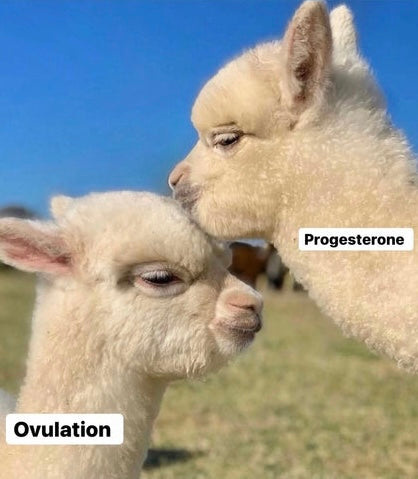
In today's post, we dive deep into the subject of progesterone. In our last blog post, we talked about how you can feel unbalanced in the days before your period (in phase 3 ). If you recognize this and often experience symptoms such as mood swings, pain or sweet tooth, it may be a sign that you have PMS which is the result of an imbalance between your two important sex hormones; estrogen and progesterone.
So, first of all, what is progesterone?
Progesterone is our calming hormone that balances out the effects of estrogen. Estrogen is the hormone that makes things grow, i.e. stimulates growth (which can have positive and negative effects in excessive amounts), it makes us become a little wild and crazy, more outgoing and increased sex drive. Progesterone, on the other hand, gives us stability and causes us to become grounded and relaxed. It is simply the hormone that keeps track of the fact that the estrogen is not completely eliminated in the body. We simply need a balance between them both to feel good both physically, emotionally and mentally. Progesterone is also the hormone that supports and supports a possible pregnancy.
What are the benefits of progesterone?
- Has calming and relaxing effects and boosts good sleep
- Supports us to be able to get pregnant (builds up the uterine lining for eggs to be able to attach and grow)
- Helps us feel calm and balanced at the end of phase 3 before menstruation (balances PMS)
- Boosts our metabolism and helps us use fat as energy
- Balances our estrogen
- Think of progesterone as the hormone that makes us feel relaxed and calm (those effects we don't want to be without). If it is the case that we are not producing enough progesterone, we will notice it in phase 3, no doubt
So, low levels of progesterone can manifest in the form of:
- Feelings of worry, panic, overwhelmed without being able to put your finger on why.
- Short, long or irregular cycles
- Feeling fluid in phase 3 (before period)
- Tend to get swollen/tender breasts in phase 3 (before period)
- Low sex drive
- Difficulty getting pregnant
- Difficulty falling asleep or sleeping through the night
-
We know what you're thinking—if progesterone is so good, how can we get more of it? That's the best thing about hormones; that we actually have the opportunity to influence
So, how do I increase my progesterone naturally?
The only way to create optimal levels of progesterone is by ovulating (which is not always the easiest thing to do). Ovulation is the main event in the menstrual cycle which involves the release of an egg from the follicle, then traveling down the fallopian tube in the hope of crossing a sperm on the way (if you want to get pregnant). Once the egg is released, the follicle develops an eggshell and that's where your progesterone levels come from. Progesterone then becomes your dominant hormone for the remainder of the cycle, i.e. during phase 3.
So simply explained: no ovulation = no eggshell = no progesterone. In any case not in sufficient amounts and levels for you to have a balanced phase 3. Sometimes it can be that you ovulate but the ovulation is weak which means that the egg shell is not strong enough to survive for enough days which means that you get a short phase 3 (phase 3 should be between 11-15 days).
Not ovulating is more common than we think. The tricky thing is that you can still have a period every month even though you haven't ovulated, which is called an anovulatory cycle. Here you can read about how to confirm ovulation in the best way.
What affects ovulation?
So, some of the most common reasons why we don't ovulate are:
- Exercising too much and hard or eating too little.
- Deficiencies in important nutrients such as vitamin B, vitamin A, vitamin D, zinc, selenium and more, all of which support ovulation).
- High levels of stress and inflammation and too little recovery.
- High levels of testosterone such as in PCOS.
So now to the important question, what can I do to give my body the conditions to ovulate?
The best thing is that we have the opportunity to influence our ovulation through lifestyle changes and work with our inner self. We know, sometimes we just want a miracle pill so we don't have to make all the changes, but it's usually where we feel the most resistance that the real breakthrough is found. So let's go into how you can influence your ovulation and thus progesterone production through lifestyle changes.
Reduce stress
Work on reducing stress and give yourself proper recovery. Both cortisol (our stress hormone) and progesterone are derived from the pro-hormone pregnenolone. So if the body is in constant stress, regardless of whether it is physical or internal stress, the body will always prioritize creating cortisol over progesterone .
Get enough food and nutrition
In order for your body to function optimally and be able to create your hormones, it needs to have enough energy (eat enough), building blocks (fat, protein and carbohydrates) and nutrients (vitamins and minerals). Your body is smart and designed for survival (food is necessary for survival) – so if the body doesn't feel safe, it will shut down ovulation to prioritize your health and safety.
Exercise the right way for you
Give yourself physical activity based on what your body needs. Use physical activity as a tool to balance your stress levels. If you're already feeling stressed by work, finances, relationships, too little sleep (the list goes on) then maybe squeezing in an intense workout isn't the best option. The body doesn't know the difference if we run from a bear or if we run intervals.
If you have a lot going on in your life right now, maybe it's more about focusing on low-intensity exercise with a focus on balancing stress rather than pushing your body? Such as yoga, walking or light strength training. This will help your body create progesterone!
Make sure your nutrient stores are tip top
The body needs nutrients to be able to ovulate. It is especially important to have enough of the vitamins and minerals that support your menstrual cycle such as: Vitamin C, Vitamin D, Vitamin B6, zinc and magnesium.
Creating progesterone is not a quick fix
It takes about 100 days for an egg to mature, which means that it takes about 3 cycles of less stress and more nutrition to be able to create higher doses of progesterone. As we know, good things usually take time - but it's worth it. Be patient and be consistent, you will see results. We promise.
If you want to read more about ovulation, we recommend reading this blog post .

